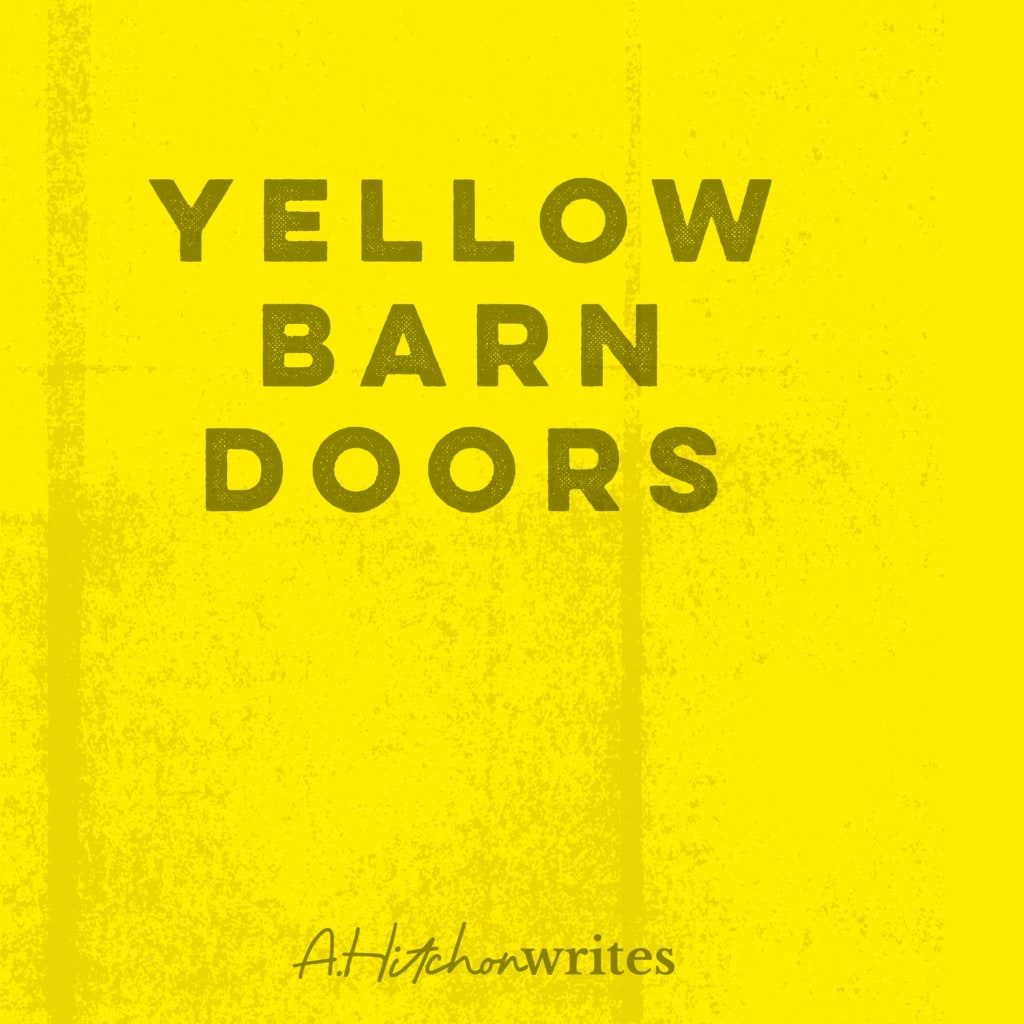
There, up the wooded hill choked with brambles, it stood. Walls, once straight, now sagged under the weight of time. Windows, once square, now slightly askew. Roof, once whole, now lay in rot on the floor inside. But the doors. Oh, the beautiful golden yellow doors. They stood strong and straight, the only buttress against total collapse. The whole of the barn leaned into them, as though a passing giant had tipped the building forward just so. But it was not a giant that had tipped the old barn forward. No. It was something much worse.
To get to the barn, of course, you would have to stop along the way and cut open the heavy chained gates. Pay no mind to the signs on them, for they are of no importance. Push past without looking. Here, a tree has fallen, blocking the drive, but no matter. You cannot drive any further anyways. It’s best experienced on foot. Now that’s better. Let’s press on.
The tree lined drive opens to a rather derelict house of no importance. There were no yellow doors here to hold it up. Were you to step inside, although you won’t, you would find trapped an eroded time capsule. Plaster has fallen, wall paper peeled, but the daily paper sits on the chair waiting to be read. A molded cup of tea sits on it’s saucer as though it had just been set down to turn to the next page of the book that lay upturned beside it. Upstairs, you would find clothing and toys, toiletries and furnishings. All of the bric-a-brac living tends to collect over time. But you won’t step into that house. Those who once lived there stepped out one day and never quite bothered to return, so why should you? It’s best to keep going.
In the back yard are more rusted remains of life. A broken swing set. An idle rake. An eyeless tractor. Step carefully now. Order has been overridden here: there is debris around to twist an ankle on, had you not been careful just now. At the end of a drive is a barn. It’s bricks straight, it’s siding mostly in tact, it’s red doors firmly shut. But this does not interest you. There is nothing inside there now. Nothing alive, anyways. It is best you don’t go in. Push past the second gate, the one leading to the back pasture. Surely, if it is stuck, you could easily climb over. The grass here is long and tangled, it grabs at your ankles as though it were saying “Stop, please. Turn back. Don’t go that way.” But we do not listen to grass. It’s best we pick up the pace. We don’t want to keep it waiting, now do we?
Hop the fence at the back pasture and there, see the space between the oak trees? There is the path. The first path. The right one. We follow it through the woods. At the top of a small hill is the sad skeleton of a charred house. The first house. The right one. You would step inside except nothing remains of it, which is really quite a shame. It was once a nice house. A happy house. If you listen closely you can hear the fire crackles and the timber screams. It was such a long time ago now, but oh, do those bricks remember. They remember everything. But this is not where we should be.
The water pump juts out from a boarded up well on a small mound beside the house. It would perhaps still work, but it is best not to try. Were you to fall down, no one is here to hear you scream except for the bricks. That would be no good. You are drawn back to the path, as it were. There isn’t really much of a path left now, this far from the road. It’s a shame, really, but you’ll manage. It’s just a little further now.
There, you see? A glint of yellow through the lush green leaves. You scrape and snap your way through the brambles. Quickly now, we mustn’t be late. Oh, are you bleeding, a bit, from that scratch? Don’t worry, it will be alright. We are really almost there now. You can make out the bones of the roof above the trees. You push past the last of the bushes and into a cleared space. There the doors are! Those beautiful yellow doors. The barn leans forward as though to welcome you. Dead vines are laced across the timber. Once, you imagine, it might have been covered in lush ivy. It would have been picturesque. That evening sun, warming the roof and then, a little lower now, it breaks out from behind a cloud and explodes onto the radiant yellow barn doors framed by lush ivy and well kept boards. Breathtaking.
Except the ivy is dead and the boards, no longer well kept, lean their coarse grey edges towards you. But the doors. Those yellow double doors with their black hinges, are still proper. Had the wind come? Or was the door on the right always opened in ever so slightly. It must have been that way when you arrived. You take a step forward and crunch the empty skull of a mouse. Or is it a—no, just a mouse. Probably an old barn cat’s dinner, brought back to show it’s prowess, and now long rotted away. Yes, it was certainly a mouse skull. Nothing more. Come, let’s not keep it waiting. See how it leans towards you, beckoning you in?
The palm of your hand feels the weathered wood grain behind the yellow paint as you gently push the right door fully inwards. It is dim inside the barn, as you take your first steps inside. But the roof is mostly gone, and sunlight dances on the dust motes. Give your eyes a moment to adjust. It feels so very, awfully, dark in here compared to the brilliance of the yellow doors. Here, lets close them behind us. It’s only proper, you see. You mustn’t leave the doors open. There, that’s better. The wood boards settle and creak in relief. It is important to keep the doors shut.
Inside, time has been most unkind. The barn boards have shrunk and shrivelled, letting cracks of sunlight seep through their seams. And the poor roof, striped bare of it’s shingles by the slow and torturous exposure to the elements. The floor is covered in rot and debris, and some reminders of time past. There, a pair of old boots. Here, perhaps what was once a pair of overalls? A small toy tractor, a rusted axe, the heavy teeth of a bear trap. You can make out some of the objects under the piles of dirt and fallen wood. But the back of the barn lies in wait.
Perhaps it is best you step forward. Come explore the long forgotten secrets of this place. Surely you don’t need the lantern for that. Just let your eyes adjust a little more. The lantern has, none the less, captured your full attention. Well thankfully you don’t have a—oh you do have a light. Good. Yes. Perhaps we can shed some light on this after all. No harm done. Now you can see the heavy chains hanging from the beams. The collapsed state of the rafters. Lets step further in. An old work bench stands in contrast to the walls. They lean in towards you, and it leans away. But no matter. It is too late for that now. Come, you have kept it waiting for so long. Come see what you had wished to see back here in the dark.
You step deeper into the barn, lantern held high. There, in the back left corner, you cast light on a pile of trophies scattered across the floor. As you pan to the right, you see, they get fresher and fresher still. Look, this one still has eyes. It’s as though she is pleading with you to save her. But it’s alright. She is dead. So are all the others that have come before you. Oh, there have been so many others. Have I shocked you? Come, you must have known. You must have, deep down in your core. You felt it, didn’t you? The draw of the yellow doors. They visited your dreams for months and pulled at the strings of your existence. Surely, this is where you belong. Surely, you won’t step out one day not to return. You’re such a nice person.
You take a staggered step backwards, then another. Well I did try to warn you not to use the lantern. You turn and run to the doors, but just as you are about to reach them you feel the heavy tug of chains around your ankle. Slowly, so very slowly, they were drawn to you. Just as you were drawn to them, to the yellow doors. You fall to the floor on your stomach, your arms reaching out in front of you as you try to claw your way forward, your way out. Your nails catch on the doors and scrape neat light lines down the black paint. Now this won’t do. This won’t do at all. Honestly.
The lantern you so carelessly dropped sputters out. We wouldn’t want anything to catch fire, would we? You scream. It is a beautiful, terrified scream. The walls swell and sigh in appreciation. The chain links clink heavily against each other and one by one the chain goes taught. There is a delightful crunch and now, I do believe, your ankle has broken. Your screams expand into those of excruciating pain. The walls swell and move with you as you get drawn further in, righting the structure. Another delightful crunch. The sound of wood cracking open. The chains tighten, then go limp. What is happening, you ask? Well I’m not to sure, really. It’s quite dark back there, you know, now that the lantern is out.
Something rattles through the pile of bones and skulls, past those still rotting, and it moves towards you, I presume. There is a wet sounding crunch when your screams become panicked. But it’s alright. It should be over soon. I don’t much care for this last part, to be honest. But it’s so very, very necessary, you see? Except that you don’t see why just yet. You scream it as a question over and over: “Why? Dear God why?” But no worries, you will see why soon. There, the squishy crunch of a skull. You see now. Everything is fine.
Better, actually. Because there, up the wooded hill choked with brambles, it stood strong. Walls, once sagged, were now straight. Windows, once askew, were now square and true. Roof, once missing, was now restored. And the doors. Oh, the beautiful, dark, blood red doors. They stood strong and straight and glistened wet under the darkness of night.
About the Creator
Andrea Hitchon
Follow me on Instagram @ahitchonwrites
📝Dystopian flash fiction
📖WIP scifi novel FALLING
Enjoyed the story? Support the Creator.
Subscribe for free to receive all their stories in your feed. You could also pledge your support or give them a one-off tip, letting them know you appreciate their work.






Comments
There are no comments for this story
Be the first to respond and start the conversation.